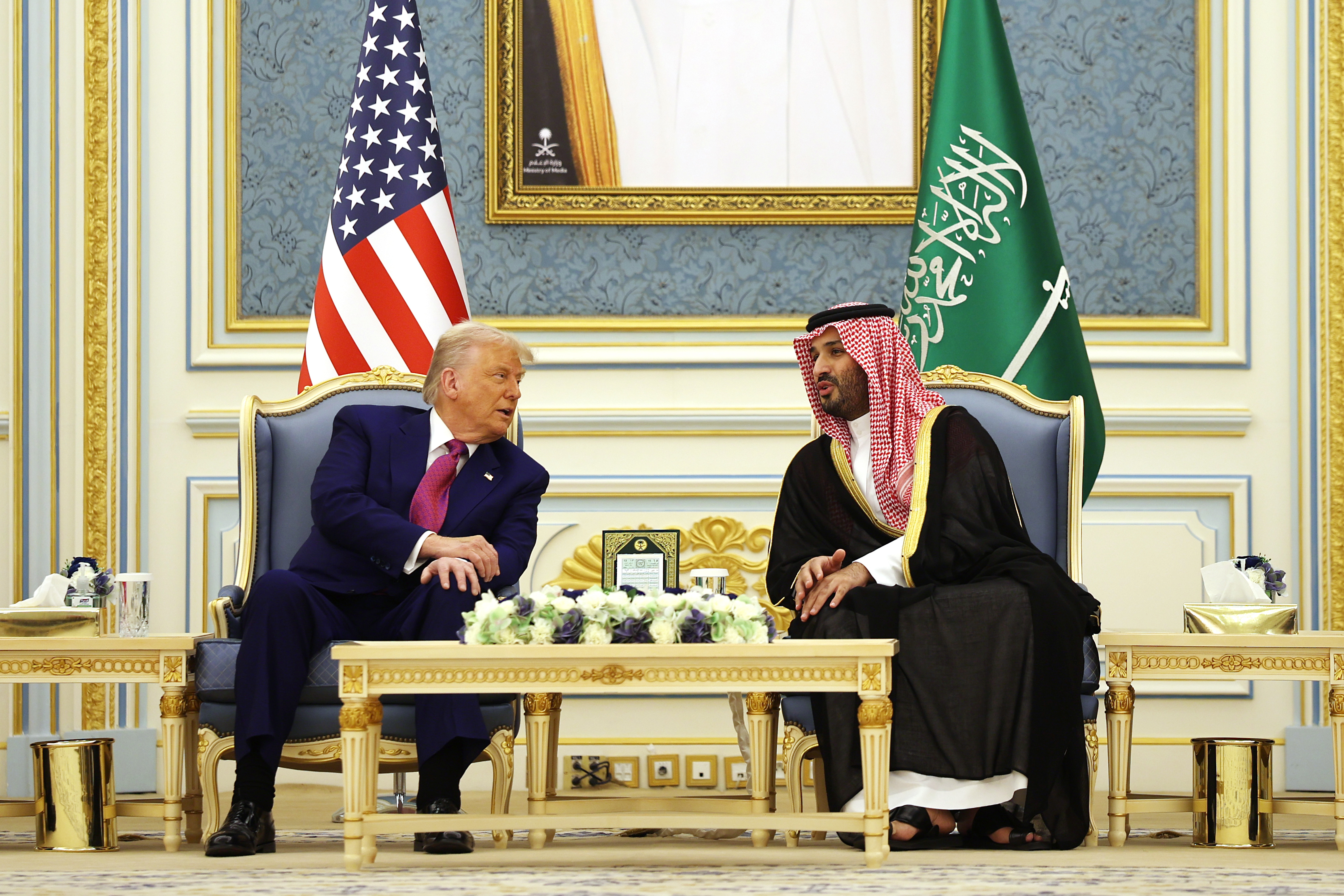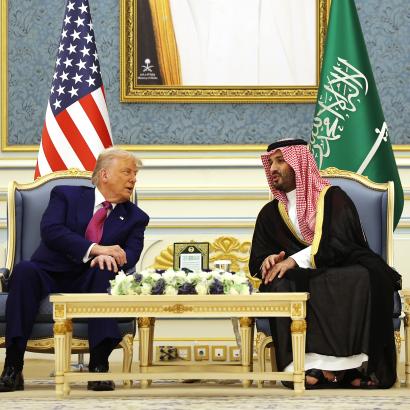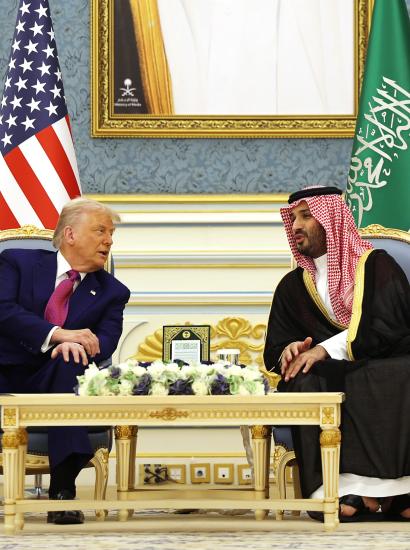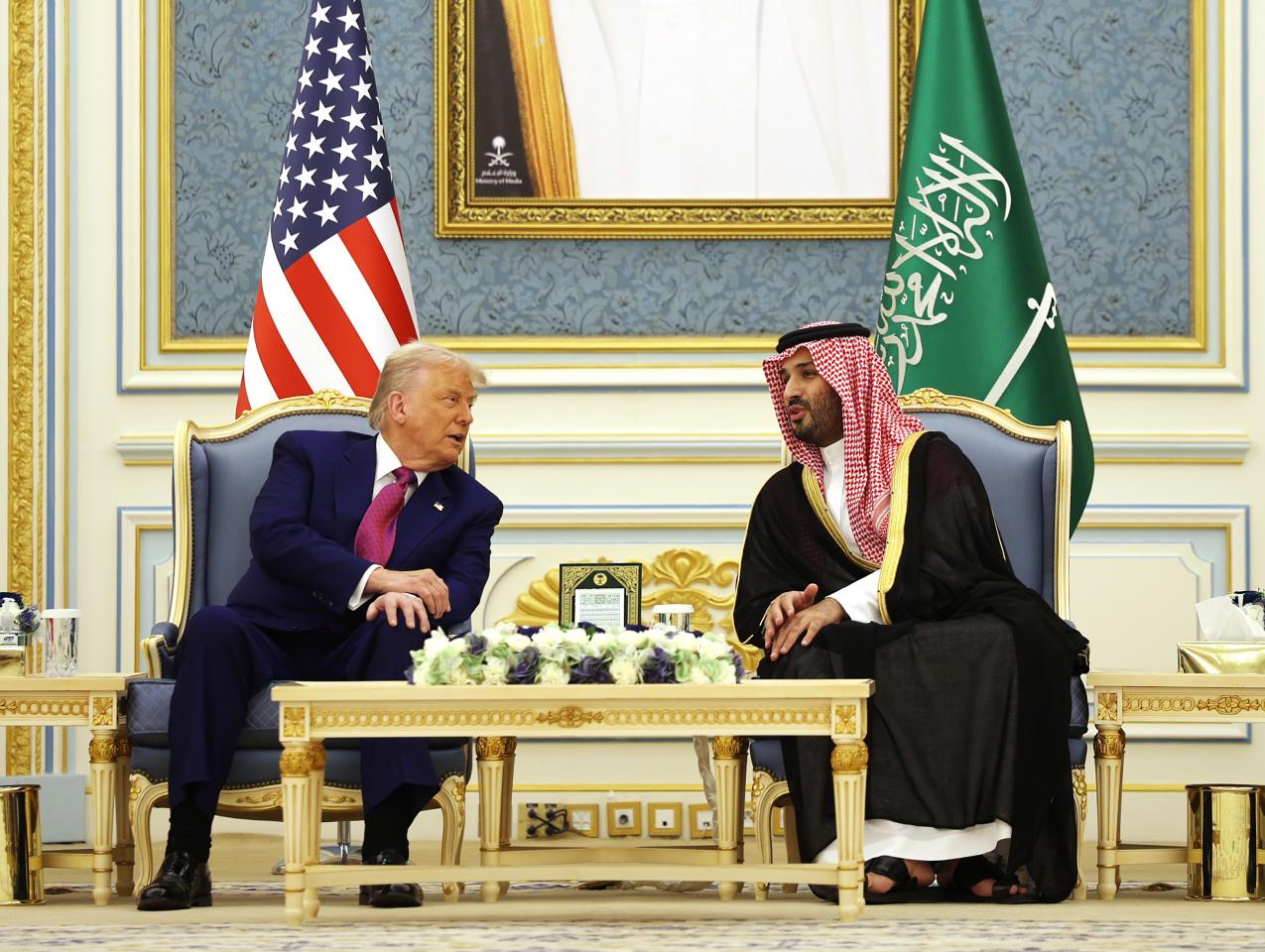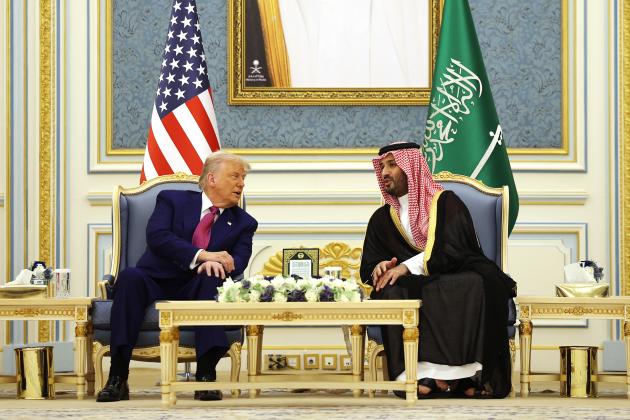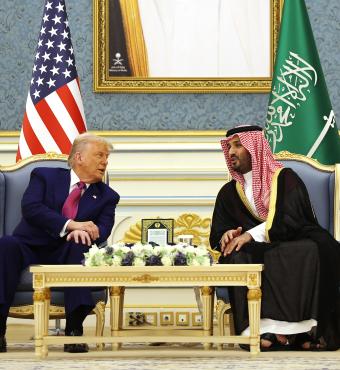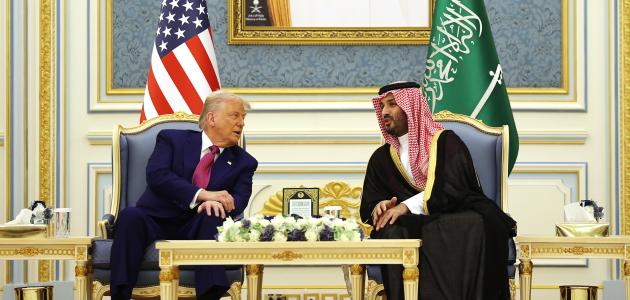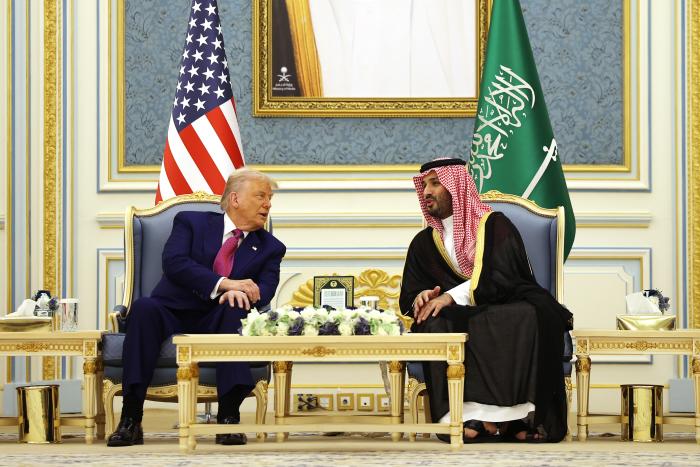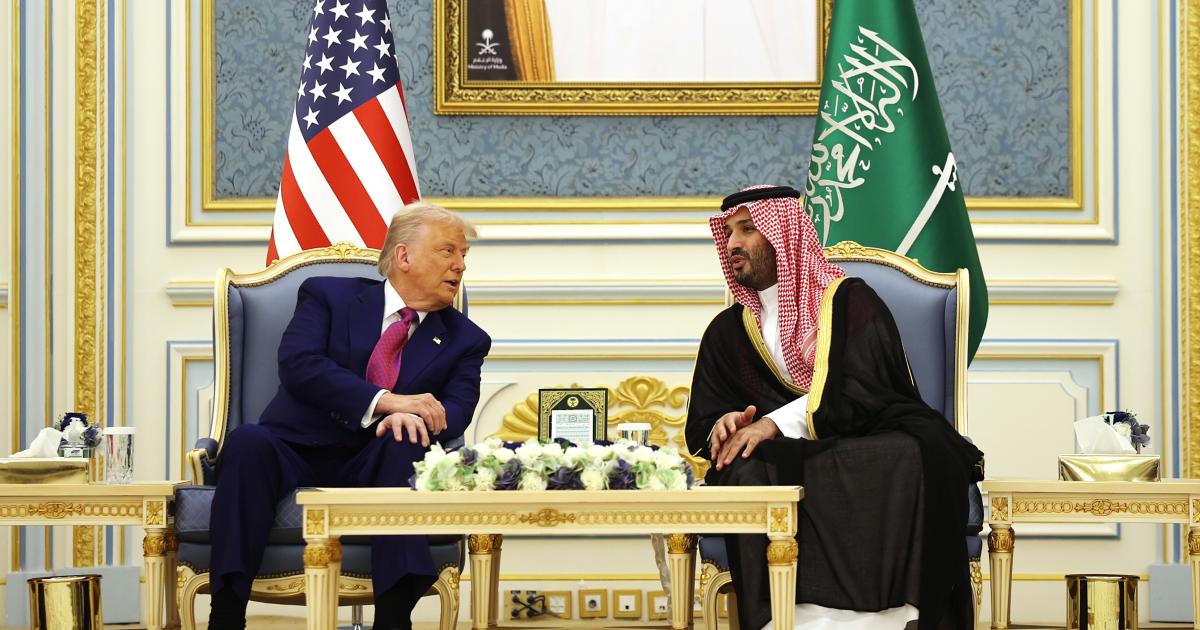- Middle East
- Determining America's Role in the World
During President Trump’s visit in May 2025 to Saudi Arabia—the destination, as in his first term, of his first overseas trip—the main event was the Saudi-U.S. Investment Forum in Riyadh where the president delivered a near-hour long address. With Crown Prince Mohammed bin Salman (MBS) in attendance, the president lavished praise on his host and host country as he honored the longstanding U.S.-Saudi alliance dating back to the 1940s. The focus of his remarks, however, was on the future, specifically what he called the “the bright future of the Middle East.” This was “the dawn of the bright new day that awaits for the people of the Middle East, the great, great people of the Middle East,” he proclaimed, urging them to “put aside your differences and focus on the interests that unite you.”
The president’s address was warmly received, frequently interrupted by bouts of applause. But at one moment his words appeared to be greeted with chilling silence. This was when he expressed his hope that Saudi Arabia would soon normalize relations with Israel by joining the Abraham Accords, the set of agreements that led to normalization between Israel and four Arab countries, including the United Arab Emirates, in 2020. “It’s my fervent hope, wish, and even my dream,” he stated midway through his address, “that Saudi Arabia, a place I have such respect for … will soon be joining the Abraham Accords … [I]t will be a special day in the Middle East, with the whole world watching, when Saudi Arabia joins us … I really think it’s going to be something special. But you’ll do it in your own time, and that’s what I want, and that’s what you want, and that’s the way it’s going to be.” The silence that filled the room seemed to beg otherwise.
Indeed, the kingdom’s attitude toward Israel has shifted dramatically since the October 7, 2023 Hamas attack and subsequent war in Gaza, which has killed some tens of thousands of Palestinians. Since the war broke out the Palestinian issue has taken center stage in regional politics, refocusing attention on a cause with which most of the Arab world, including the Saudi population, is broadly sympathetic. The vibe shift has been pronounced. Before October 7, Saudi-Israeli normalization was very much a possibility, even a probability, in the not-too-distant future. Saudi officials, including the crown prince, spoke openly about it. The Saudi media seemed to be readying the ground for it. Representatives of pro-Israeli groups from the United States, and even lower-ranking Israeli officials, were welcomed in Riyadh. Gradually, the prospect of normalization was being normalized. All such efforts have since been brought to an end, and it is hard to imagine them restarting again soon.
The Biden Plan
It was during the second half of the Biden administration, in 2023, when momentum toward normalization began picking up at the instigation of the White House. Having scrapped its policy of “recalibrating” the relationship with Saudi Arabia on account of the murder of Jamal Khashoggi in 2018, the Biden team pivoted to a policy of courting Saudi Arabia in pursuit of a deal for Saudi-Israeli normalization. In return for providing Saudi Arabia with, among other things, a security guarantee in the form of a Senate-ratified treaty, Riyadh and Jerusalem would agree to normalize relations in what would be a highly symbolic follow-on act to the Abraham Accords. It was an agreement from which all parties stood to gain. Saudi Arabia would have the official backing of the U.S. military in the event of a confrontation with its chief adversary, Iran. Israel would gain recognition of its right to exist by the world’s leading Muslim country. And the United States would have secured a breakthrough in promoting peace between Israel and its neighbors, paving the way for broader acceptance of the Jewish state in the Islamic world. There were still hurdles to clear, but things were trending in the right direction. Even the crown prince appeared optimistic.
Less than a month before October 7, in an interview with Fox News’ Bret Baier, MBS was asked explicitly about progress in negotiations with Washington over a normalization deal. “Every day we get closer,” the crown prince answered, adding that the agreement stood to be “the biggest historical deal since the end of the Cold War.” He stressed, however, that “the Palestinian issue is very important” and would need to be resolved to Saudi satisfaction before such a deal could take place. Exactly what this required was unclear, but his words suggested something possibly short of Palestinian statehood. In the interview, MBS spoke of his wish for “a deal that would give the Palestinians their needs,” and of his desire “to see a really good life for the Palestinians.” Whatever this meant, negotiations were clearly ongoing.
It was not the first time MBS had signaled a certain friendliness toward Israel. In early 2022, in an interview with The Atlantic, he had stated, “We don’t look at Israel as an enemy, we look to them as a potential ally, with many interests that we can pursue together. But we have to solve some issues before we get to that.” The main issue, of course, was the Palestinians.
Meanwhile, the discourse in official Saudi media was growing increasingly favorable to the idea of official ties with Israel. This was the case even before the Biden administration started seriously to pursue a deal. Back in 2020 the Saudi press had covered the signing of the Abraham Accords mostly positively. In August 2020, just after the UAE’s agreement with Israel was announced, the columnist in al-Sharq al-Awsat Abdulrahman Al-Rashed defended the Gulf state’s right—indeed the right of “every Arab state”—to conduct its foreign relations in accordance with its interests. In October, the Saudi-owned Al Arabiya network broadcast an interview with Saudi writer Abdullah Bin Bijad Al-Otaibi advocating that Riyadh join the accords. Days later, the same network released an interview with Prince Bandar bin Sultan, the former Saudi ambassador to the United States, castigating the Palestinian leadership for complaining about the accords. “The Palestinian cause is a just cause but it has failing advocates,” he stated. “There is a common denominator between the Palestinian leaders throughout history: They always place their bet on the losing side.”
In March 2022, in al-Sharq al-Awsat, columnist Mashari al-Althaydi declared Israel “an objective ally” of the kingdom by virtue of their shared enemy in the Iranian regime. In July of the following year, Faisal Abbas, the editor-in-chief of Arab News, wrote that the possibility “of a US-brokered Saudi-Israeli normalization deal” was “highly likely,” going on to explain why this was so. After MBS’s interview with Fox News in September, al-Sharq al-Awsat published a long analysis on the “historic choice” facing Israeli Prime Minister Netanyahu, who could either pursue the deal to normalize relations with Saudi Arabia or else cater to the interests of his right-wing governing coalition. “The crown prince has chosen to put the ball in Israel’s court.”
The Unraveling
According to one poll, only 16% of Saudis held a positive view of the Abraham Accords in 2021, a figure that rose to just 20% at the beginning of 2023. Evidently, anti-Israel sentiment still ran quite deep in the Saudi population in the period leading up to October 7, meaning that normalization was a potentially hazardous course for MBS to pursue. In MBS’s mind, however, the potential assets to be gained from a deal seemed to compensate for the liabilities in terms of the unpopularity of normalization with the Saudi public. But after October 7, with all the newfound attention on the Palestinian issue, together with the incessant deluge of images of killed and maimed Palestinians at the hands of the Israeli Defense Forces, the Saudi calculus shifted. Normalization would now simply be too great a risk to run.
Indeed, the war in Gaza brought all momentum in negotiations to a halt. Almost immediately Saudi Arabia suspended talks with the United States over the potential deal, as Saudi officials publicly registered their disapproval of the Israeli military action. As the war progressed, further Saudi condemnations followed, growing increasingly severe over time. In May 2024, the Saudi Foreign Ministry began describing the war as a genocide, condemning “the continuous genocidal massacres committed by the Israeli occupation forces against the Palestinian people without deterrence.” In November, the crown prince adopted the same verbiage, telling a gathering of Arab and Muslim leaders that “the kingdom reaffirms its condemnation and categorical rejection of the genocide being perpetrated by Israel against the brotherly Palestinian people.”
Another shift concerned the price Saudi Arabia was demanding for normalization. Whereas before MBS had signaled a certain ambiguity as to what would be needed for the Palestinians, the price was now unequivocally a Palestinian state, together with an end to hostilities in Gaza. In September 2024, at a meeting of the kingdom’s Shura Council, MBS announced that “the kingdom will not cease its tireless efforts to establish an independent Palestinian state with East Jerusalem as its capital, and we affirm that the kingdom will not establish diplomatic relations with Israel without one.” Previously, only the Saudi Foreign Ministry had spoken in such terms of the absolute necessity of a Palestinian state. In October, Foreign Minister Faisal bin Farhan stated that normalization was “not just at risk; it is off the table until we have a resolution to a Palestinian state.” In early 2025, after Trump announced his “riviera” plan for Gaza requiring the (at least temporary) displacement of the Gazan population, the Saudi Foreign Ministry dismissed the idea with reference to MBS’s earlier remarks. “The Foreign Ministry affirms that Saudi Arabia’s position on the establishment of a Palestinian state is firm and unwavering,” a statement read. MBS had “clearly and unequivocally reaffirmed this stance.” By the beginning of the Trump administration, then, it was clear that Saudi Arabia’s position on Israel had hardened.
There are two caveats, however, to what is otherwise a rather bleak picture for potential Saudi-Israeli normalization. One is that MBS, for all that his government has now publicly identified itself with the Palestinian cause, does not himself seem personally invested in it. According to The Atlantic, MBS told then-Secretary of State Anthony Blinken in January 2025, “Do I care personally about the Palestinian issue? I don’t, but my people do, so I need to make sure this is meaningful.” For MBS, catering to popular sentiment seems to be the driving force behind his government’s anti-Israel messaging and firm line on Palestinian statehood. His position, in other words, is not ideological but practical, meaning that it could be liable to change if conditions become more amenable. It is worth recalling that in 2018 MBS stated that Iran’s supreme leader, Ayatollah Khamenei, was worse than Hitler. This didn’t stop Saudi Arabia from reestablishing diplomatic relations with Iran in 2023.
The second caveat is that despite all the rhetorical bluster, Saudi policy remains committed to Israel’s regional integration, albeit now resolutely within the framework of a two-state solution. In late July, the kingdom, together with France, co-chaired a conference at the United Nations titled the International Conference on the Peaceful Settlement of the Question of Palestine and the Implementation of the Two-State Solution. The conference produced a joint declaration—signed by 22 Arab countries and 17 other Muslim countries—explicitly condemning Hamas’s October 7 attack and calling on Hamas to “free all hostages” and “end its rule in Gaza and hand over its weapons to the Palestinian Authority.” To be sure, there is much in the declaration to which the Israeli government would object, not the least of which is the insistence on a Palestinian state, a highly unpopular proposal in today’s Israel. Nonetheless, for Saudi Arabia to take the lead in a pan-Islamic effort to condemn and stigmatize Hamas as beyond the pale is a positive sign for potential Saudi-Israeli ties. Saudi Arabia is not rallying the Islamic world to boycott and isolate Israel as it once did.
Impasse
All this being said, the stark reality is that Saudi Arabia and Israel are at an impasse insofar as normalization is concerned. Regional dynamics have shifted such as to make a deal practically inconceivable in the near future. With the war in Gaza, MBS has taken the decision to position the kingdom as the leading champion of the two-state solution, all the while issuing statement after statement condemning Israel. From a realpolitik perspective, this is perfectly understandable. Israel’s reputation in the Arab and broader Islamic worlds has plummeted—from an already very low baseline—as the war in Gaza has gone on. Saudi Arabia, as the steward of the two holiest sites of Islam in Mecca and Medina, reasonably fears the cost to its standing and reputation if seen as allying itself with this deeply unpopular force. To take on the role of peacemaker is a far safer bet. Another factor at play is that with Iran and its proxies at their weakest point in recent memory—on account of Israel’s and the United States’ military successes against the Iranian axis—the primary incentive driving normalization in recent years—namely the shared fear of Iranian aggression—has receded in importance.
Rather than seek a major coup in the form of a normalization deal between Jerusalem and Riyadh, which the latter is in no position to countenance at this time, the Trump administration ought to focus its efforts on removing the structural barriers standing in the way of such a deal. This begins with finding an end to the war in Gaza and helping to foster a political order in the territory that enjoys broad regional buy-in. In this way, room may emerge for more constructive avenues of cooperation between Israel and Saudi Arabia that could ultimately flourish into something greater. But it will be a long time before MBS again speaks optimistically about ongoing negotiations over normalization.







